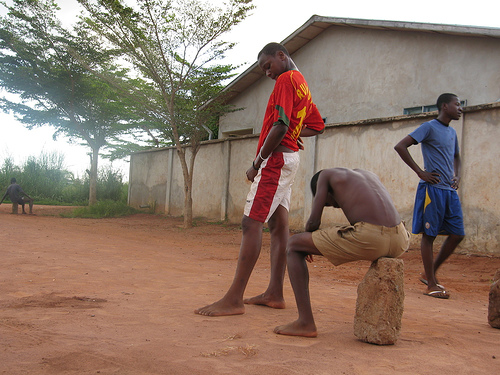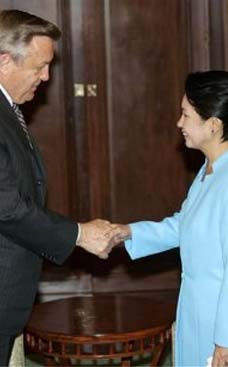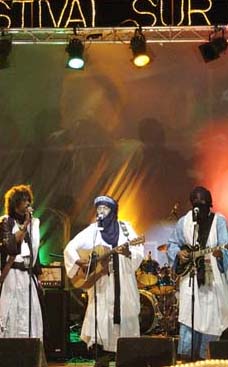
My Francophone credentials derive from my service as a Peace Corps Volunteer some 20 years previously, when I did community development work in the former French colony of Mali in West Africa. Fresh out of college with a major in Medieval and Renaissance Studies, I had not contemplated a career in medicine. Yet, it was there that I had my first clinical encounter—in French. It happened a few days after my arrival, during the orientation period at the Hôtel de l'Amitié in the Malian capital, Bamako. We were playing soccer on a packed dirt yard next to the hotel, and several Malian men joined in after shedding their sandals to play—in typical fashion—barefoot. One of the Malians gouged his big toe and opened a jagged laceration that, in retrospect, might have triggered a specialist consultation in our country. My fellow Peace Corps trainees deputized me to minister to his wound. My qualifications were a combination of extroversion and a facility with French gained 2 years earlier as a student in France. In addition to the wound, the injured footballer was physically remarkable for his albinism. I patched him up from a standard issue Peace Corps medical kit with peroxide, antibiotic ointment, gauze, and tape. The "patient" was grateful. From the encounter, I learned several interesting things. First, the injured footballer was (and still is) one of Mali's most prominent musicians. Second, albinism is a common congenital "abnormality" in that part of West Africa (noted in some cultural narratives to be the penalty for lovemaking during the day). Third, the idea of white people providing medical care was an inescapable cross-cultural expectation. The ubiquitous salutation for whites in Mali is "Toubabu" and is derived from the Arabic term for doctor, toubib. In retrospect, I realized that this must be a powerful stereotype if a person with the status of, say, Billy Joel or Bob Dylan would let a perfect stranger and medical novice provide his care.
Mali RPCV Paul Roman Chelminski writes: Crossing the Cultural Chasm
Crossing the Cultural Chasm
right arrow Paul Roman Chelminski, MD, MPH
3 July 2007 | Volume 147 Issue 1 | Pages 67-68
Photo: chillum Flickr Creative Commons Attribution-NonCommercial-NoDerivs 2.0
A colleague requested that I provide general medical care for a friend of his, a French citizen. The patient wanted a physician who would provide medical care in her language. My Francophone credentials derive from my service as a Peace Corps Volunteer some 20 years previously, when I did community development work in the former French colony of Mali in West Africa. Fresh out of college with a major in Medieval and Renaissance Studies, I had not contemplated a career in medicine. Yet, it was there that I had my first clinical encounter—in French.
It happened a few days after my arrival, during the orientation period at the Hôtel de l'Amitié in the Malian capital, Bamako. We were playing soccer on a packed dirt yard next to the hotel, and several Malian men joined in after shedding their sandals to play—in typical fashion—barefoot. One of the Malians gouged his big toe and opened a jagged laceration that, in retrospect, might have triggered a specialist consultation in our country. My fellow Peace Corps trainees deputized me to minister to his wound. My qualifications were a combination of extroversion and a facility with French gained 2 years earlier as a student in France. In addition to the wound, the injured footballer was physically remarkable for his albinism. I patched him up from a standard issue Peace Corps medical kit with peroxide, antibiotic ointment, gauze, and tape. The "patient" was grateful.
From the encounter, I learned several interesting things. First, the injured footballer was (and still is) one of Mali's most prominent musicians. Second, albinism is a common congenital "abnormality" in that part of West Africa (noted in some cultural narratives to be the penalty for lovemaking during the day). Third, the idea of white people providing medical care was an inescapable cross-cultural expectation. The ubiquitous salutation for whites in Mali is "Toubabu" and is derived from the Arabic term for doctor, toubib. In retrospect, I realized that this must be a powerful stereotype if a person with the status of, say, Billy Joel or Bob Dylan would let a perfect stranger and medical novice provide his care.
With this inaugural clinical encounter in mind, the anticipated consultation with the French patient triggered some insecurity. Though linguistically adept in the idioms of politics, third-world development, and bar slang, my mastery of medical French was untested and probably no better than the medical Spanish acquired muddling through encounters with the burgeoning Hispanic population of North Carolina. The French patient was a well woman of 37 years of age. Her French physician and another American physician had established that she had hypercholesterolemia. Her cholesterol was impressively elevated, as was that of her family members. Her total cholesterol was 346, the low-density lipoprotein 240, and the high-density lipoprotein 66. The patient was a nonsmoker and had no other cardiovascular risk factors, and there was no history of early family cardiovascular disease.
After the history and physical, we discussed the significance of her cholesterol. She wanted to know whether or not cholesterol medication was indicated now. I calculated that her 10-year risk of heart disease was 1%—higher than the average "less than 1% risk" for a woman her age, but her cholesterol did not confer a substantially increased risk at age 37. Factoring in a modest increase in systolic blood pressure, I projected forward 20 years and showed that at age 57 her risk would be 10% whereas the average risk for a woman her age would be 5%. I explained that in the absence of other risk factors and without a family history of early cardiovascular disease, there was no clear-cut indication for medication. In fact, I elaborated, the lack of a family history of cardiovascular events might indicate that, for her, cholesterol was not a marker of increased risk. In any case, I would honor her preference on this matter. Confounded by my ambivalence, she declared emphatically, "This is very American! You're the doctor. You decide!"
Reminded of my first treatment act as a Peace Corps volunteer, I was pleased at having once again fulfilled a cultural stereotype. I was alarmed, though, that the clinical encounter was short-circuiting. I had assumed that a relativistic and rationalistic approach to medical decision making would be especially appealing to a French person; after all, hers was the cultural legacy of such great post-Renaissance thinkers as Descartes, Voltaire, and, my favorite, Montaigne. Their rejection of superstition and dogma cleared the playing field for the emergence of the scientific method as the arbiter of knowledge and truth in Western society.
A few days later, I cornered a colleague in clinic and related this story. A prominent health services researcher, he responded with alacrity: "You get an A for shared decision making and a D for cultural competency."
Shared decision making and cultural competence are inherently relativistic concepts. The science of medicine informs the former, whereas the latter is founded on less tangible, but ultimately more potent, cultural factors. Shared decision making is an offshoot of the patient-centered care movement of the late 1960s. Cultural competency is a phenomenon of the 1990s. They share common goals; both seek to improve care by individualizing it and incorporating patient values into decision making. Patient-centeredness and cultural competency both de-emphasize the primacy of provider values. The former takes into account the experiences and perspectives of the individual, while the latter accounts for the powerful cultural forces that shape a person's values.
I often tell patients and students that an essential task of an internist is to help patients negotiate the uncertainty of disease and the bewilderment that the health care system causes. Rather than assuaging this patient's uncertainty, I had compounded it. Although command of French—which had proved so essential in my inaugural care act—had led to effective communication of facts, it had foundered on a cultural divide of false, schoolbook assumptions about how culture would influence one individual's values. The crucial final step of translating communication into care—which the patient experiences as comfort—had not occurred.
This encounter illustrated not only the conflict between 2 important themes of general internal medicine but also the challenge of chronic illness care. Physician empowerment is a hallmark of acute care, whereas patient empowerment is a shibboleth of chronic care. A presumed "culturally competent," though medically inexperienced, 22-year-old Peace Corps volunteer had created a grateful patient. A medically competent board-certified internist had sown confusion.



















